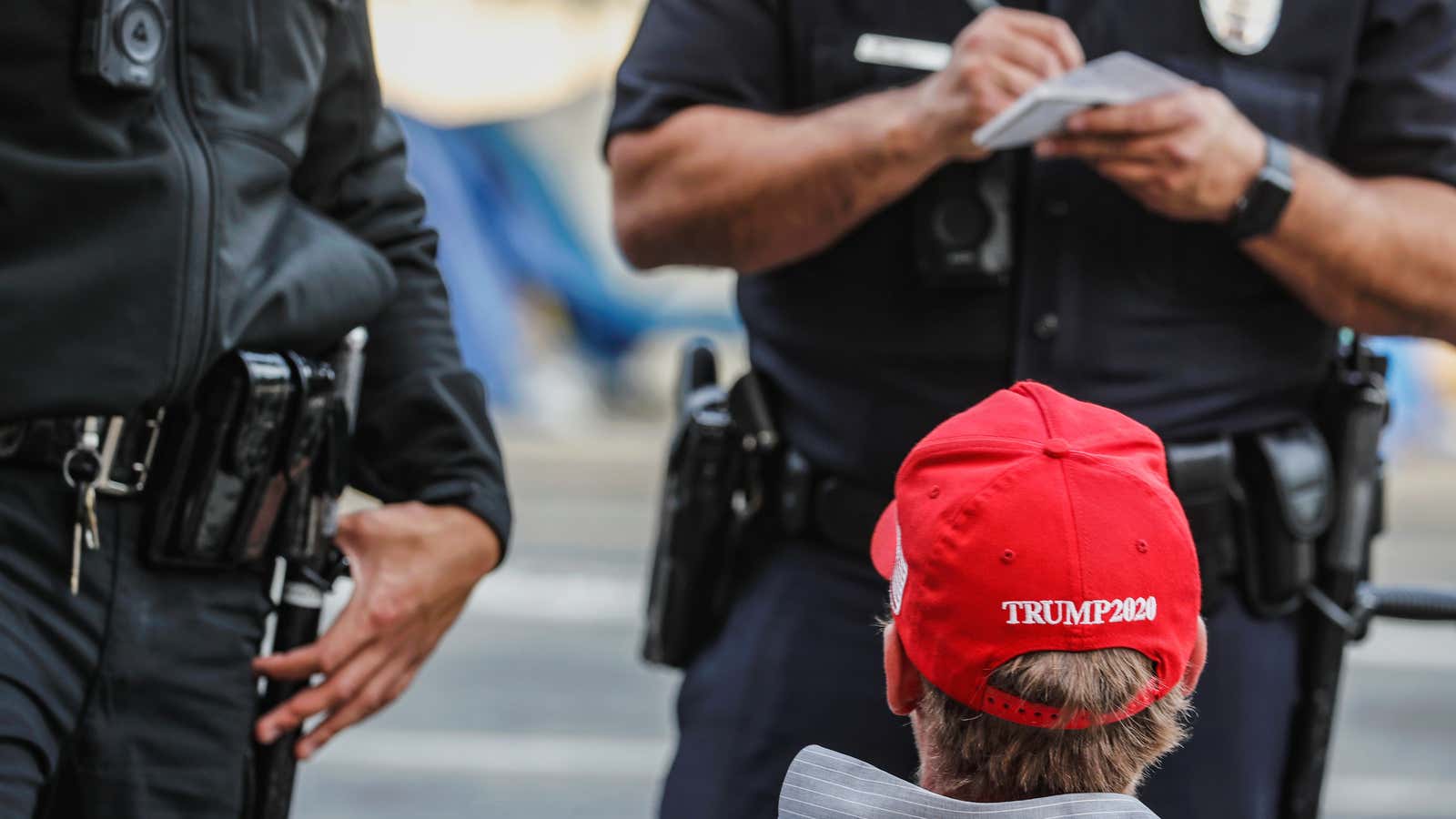The world’s biggest social media sites have locked Donald Trump out—and it could become permanent.
Twitter, Facebook, and Facebook-owned Instagram all temporarily blocked the 45th president of the US on Jan. 6. Today (Jan. 7), Zuckerberg announced a two-week suspension of Trump from all its platforms, at least until after Biden’s inauguration. “We believe the risks of allowing the President to continue to use our service during this period are simply too great,” he wrote.
The move came after violent Trump supporters stormed the US Capitol as a joint session of Congress was meeting to certify Democrat Joe Biden’s presidential victory. For weeks, Trump has baselessly cast doubt on the integrity of the election, and urged his supporters to come to Washington to protest; yesterday he urged them to march to the Capitol building and “show strength.”
In the aftermath of the mob rampage, an ex-Facebook executive and a former Twitter investor called on the platforms to ban a US president who has used their sites to make threats and spread disinformation. Hours later both platforms suspended his account, marking an unprecedented rebuke of Trump from the very companies that have served as megaphones for him.
But how long can and will these platforms hold Trump back?
Twitter’s final warning
Twitter’s policy states that elected and government officials are exempt from tweet takedowns, given “the significant public interest in knowing and being able to discuss their actions and statements.” In the past, Twitter restricted but did not remove disturbing Trump tweets. In May, Twitter began appending fact-check labels to some of the president’s tweets.
After the election, the site said Trump could well end up being banned from the platform when he becomes a civilian on Jan. 20, 2021, and loses the special protection he has had in the past four years. But in his last days in office, Trump’s multiple inaccurate and inflammatory posts have posed a fresh challenge to the platforms for how to police him.
Yesterday’s rioters were egged on by Trump repeatedly questioning the integrity of the November 2020 election for weeks. He declined to condemn the mob, even after the storming, instead saying he loved them. What Biden labeled an “insurrection” and US lawmakers, as well as world leaders, condemned strongly, Trump minimized in a now-deleted tweet, saying, “These are the things and events that happen when a sacred landslide election victory is so unceremoniously & viciously stripped away.”
Then, in a video message supposedly intended to calm the situation down and calling for “peace,” Trump reiterated the “fraudulent” election “was stolen from us.”
Twitter yesterday required the removal of three of the president’s posts, citing “repeated and severe violations of our civic integrity policy” and said the account would be blocked until he deleted them. Trump has since removed the offending tweets and Twitter says his account will be restored after a 12-hour block, which is policy, according to Bloomberg’s White House reporter Jennifer Jacobs on Jan. 7.
The backlash to the decision was clear to see. One irate user said, “So it was like a timeout for toddler. Farcical.”
But the platform, where Trump has over 88 million followers, has warned it will permanently suspend Trump’s account if he continues to violate its policies. In that case, he’d meet the same fate as former Trump White House official Steve Bannon, who was permanently removed from Twitter after he called for the decapitation of US infectious disease expert Anthony Fauci.
Facebook’s fast(er) response
While Twitter and YouTube immediately suspended Bannon in November, Facebook mulled over the decision for several days. On Trump, too, Facebook has been less aggressive in terms of using warning labels and restricting a post’s reach than Twitter.
However, on Jan. 6, the Mark Zuckerberg-led company was seemingly quick on its feet. Guy Rosen, who leads Facebook’s safety and integrity efforts, said it too was removing the Trump video with the election fraud claims.
The platform is also seeking out and removing the following content:
- Praise and support of the storming of the US Capitol
- Calls to bring weapons to locations across the US—not just in Washington but anywhere in the US—including protests
- Incitement or encouragement of the events at the Capitol, including videos and photos from the protestors. At this point they represent promotion of criminal activity which violates our policies.
- Calls for protests—even peaceful ones—if they violate the curfew in DC
- Attempts to restage violence tomorrow or in the coming days
But as mainstream platforms have cracked down on the conspiracy-laden content popular among Trump supporters, other smaller rivals like Parler, MeWe, and Gab are welcoming these users. Even if Trump ends up being banned on Twitter or Facebook for real, he can continue to find an audience on these platforms, which claim to champion free speech, but will likely foment further division during Biden’s presidency.
